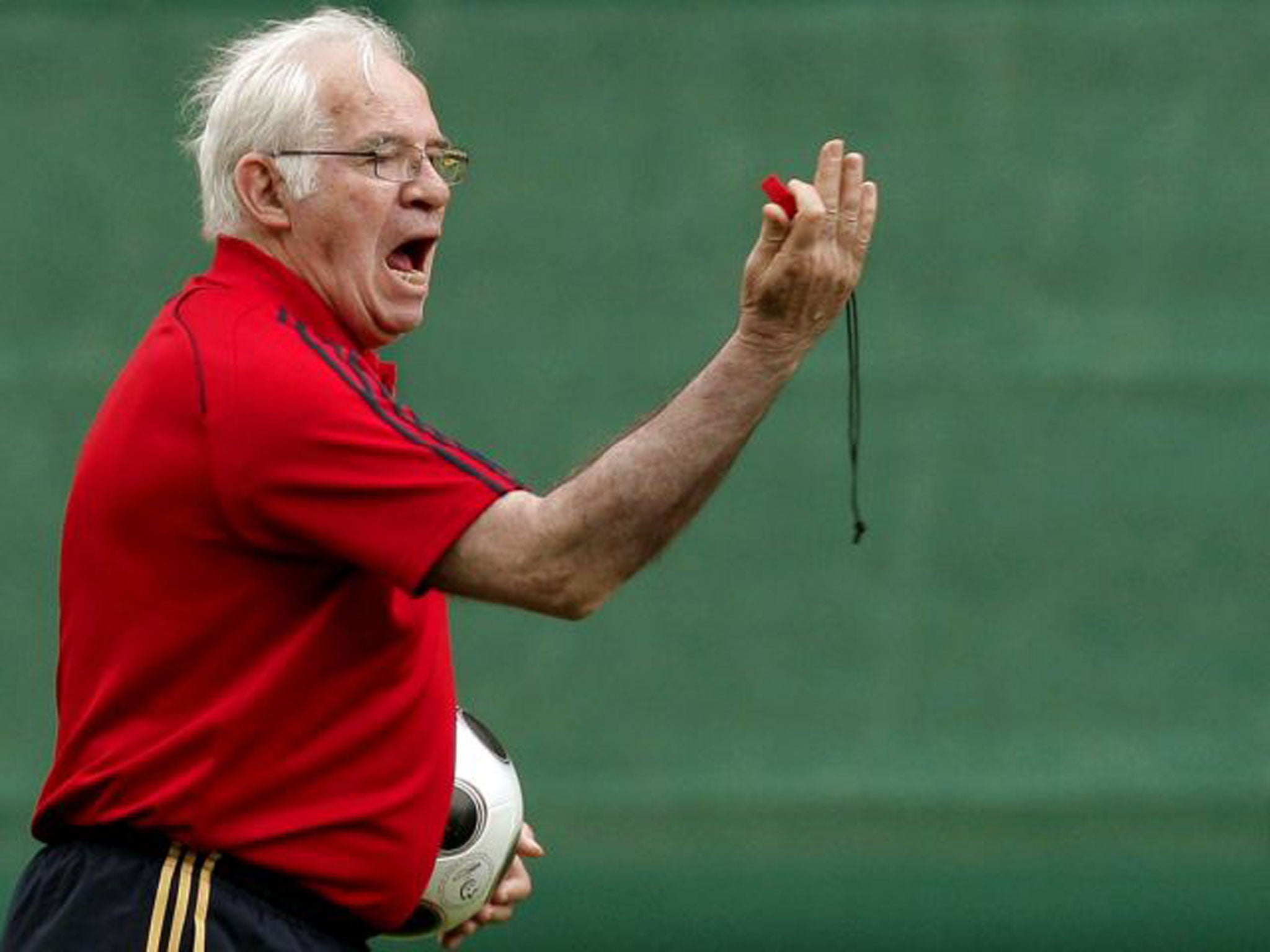Luis Aragones: Footballer and coach who laid the foundations for Spain's golden generation but became embroiled in controversy

Addressing Spain's players before they faced Russia in the semi-finals of Euro 2008 in Vienna, Luis Aragones was characteristically blunt. "If I don't reach the final with you," he said, looking at Fernando Torres, David Silva, Xavi, Andres Iniesta, Cesc Fabregas and other stellar talents from Barcelona, Real Madrid and beyond, "it means I'm a crap coach and I've organised a crap team."
Spain won 3-0, going on to defeat Germany 1-0 in the final with a goal by Torres, the prodigy Aragones had introduced to the Atletico Madrid side in 2001, shortly after the player turned 17. It was an overdue breakthrough for a country whose domestic football boasts two of the planet's legendary clubs yet whose national side had reached the final of only one major tournament (Euro 84, which they lost) in the previous 44 years.
Aragones, who has died aged 75, thus laid the foundations for Spain's ensuing triumphs; with Vicente del Bosque at the helm, the perennial under-achievers lifted the World Cup in South Africa in 2010 and retained their European title two years later. He did it, moreover, by initiating a short-passing, possession-fixated style of football which played particularly to the strengths of the Barcelona men at his disposal and has become renowned as "tiki-taka".
"You are a team," Aragones told his squad. "You are not Madrileños, Catalans or Basques. You are Spain." Other coaches had striven to bridge the regional, linguistic and political divides that undermined the Spain team for decades. That Aragones should have been the one to achieve it is perhaps unsurprising given the sheer force of personality he brought to a long career in football, latterly in coaching but first as a forward good enough to play 11 times for Spain between 1965 and '72, scoring three goals.
He was variously described as a maverick, an iconoclast, cantankerous, ultra-competitive and volatile, not unlike Sir Alex Ferguson, especially when he remarked: "I've had my outbursts, but mostly when I'm right".
However, he was also branded a racist in 2004. A Spanish TV crew caught him at a Spain training session with his forehead pressed against that of Jose Antonio Reyes, who had recently joined Arsenal, where he played alongside Thierry Henry. Staring into Reyes' eyes he ordered him to "tell that black shit you're better than him". When the story broke in the British media, Aragones maintained he had merely "made a joke to try to motivate a player". He was "a citizen of the world", he protested, adding: "Some of my best friends are black."
The Spanish FA was fined £55,000, but Henry reportedly laughed it off, while Marcos Senna, a Brazil-born black player who become a naturalised Spaniard and a member of Aragones' midfield in Euro 2008, insisted Aragones was "not racist, but a spectacular person, adored by the players". Samuel Eto'o, the Cameroonian forward with Chelsea who served him at Real Mallorca, tweeted of his "profound pain" at the death of "a great man...a father figure to me."
The teenaged Aragones was signed by Real Madrid from Getafe but did not progress from the reserves. Top-flight opportunities came his way with Real Oviedo and Real Betis, though he did not hit his stride until he returned to his native city with Atletico in 1964. Nicknamed "Zapatones", or "Big Boots", he scored a club-record 172 goals in 372 games for them, many from free-kicks, helping to win La Liga in 1966, 1970 and '73.
Contesting the European Cup the following season, Atletico were brutal and cynical against Celtic in the first leg of the semi-final, having three players sent off but leaving Glasgow with a 0-0 draw. They took the second leg 2-0. In the final against Bayern Munich, the trophy once dominated by Real looked destined for the "roja y blanca" when Aragones scored deep in extra time. Bayern equalised with 90 seconds remaining and romped home 4-0 in the replay.
Aragones promptly began the first of four spells as Atletico's coach, spread over four different decades. After guiding them to the Intercontinental Cup in 1974 against the South American champions Independiente of Argentina (Bayern declined to participate), he added the Copa del Rey in '76 and La Liga in '77. In 1986 he led them to the European Cup-Winners' Cup final, won by Dynamo Kiev. He also coached Betis (twice), Barcelona (where he succeeded Terry Venables in 1987 but stayed only eight months), Espanyol, Sevilla, Valencia, Oviedo and Mallorca (twice). He took over at Fenerbahce in Turkey in 2008-09, but admitted last year: "Age has retired me."
Yet it is as the coach under whom Spain at last fulfilled their potential that "Don Luis" will be remembered. Vilified for dropping the team's poster boy and record goalscorer, Raul of Real Madrid – a Spanish equivalent of the England manager Graham Taylor hauling Gary Lineker off the pitch during Euro 92 – he stuck to his principles despite an anticlimactic World Cup in 2006. Manchester United's Juan Mata, who scored in Spain's rout of Italy in the Euro 2012 final, delivered a fitting epitaph: "He gave birth to the best Spanish football in history."
PHIL SHAW
Jose Luis Aragones Suarez, footballer and coach: born Madrid 28 July 1938; married Pepa (five children); died Madrid 1 February 2014.
Join our commenting forum
Join thought-provoking conversations, follow other Independent readers and see their replies
Comments